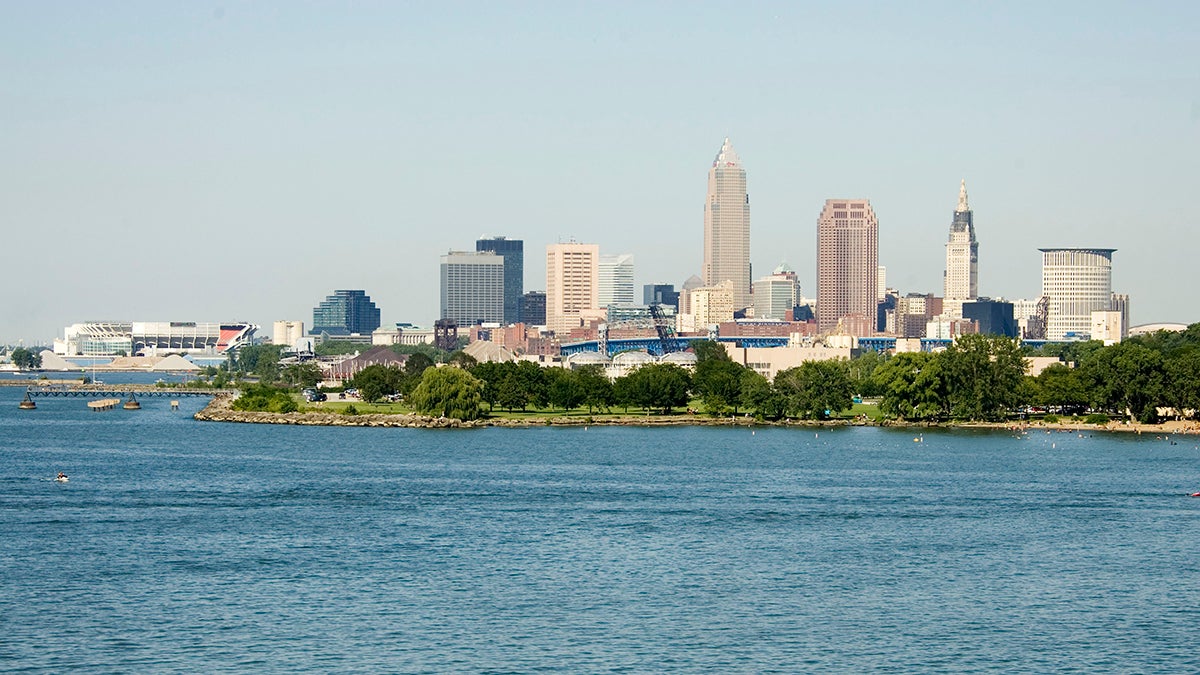Ideas Worth Stealing: Can municipalities build better broadband networks?

The downtown Cleveland skyline is seen on Lake Erie. Cleveland is one of the cities installing a municipal broadband network that it hopes will bring about economic development. (AP Photo/Mark Duncan)
Some states, including Pa., have laws limiting municipal broadband. Passed under the guise of constituent protection, some communities insist on having the option.
Ideas Worth Stealing: Every week, Keystone Crossroads will look to cities across the world for lessons in urbanism and municipal governance that could benefit Pennsylvania. No city does it all right, and we hope these examples from metropolises near and far inspire and encourage cities here to think outside the box.
Cleveland, Ohio, working with the nonprofit OneCommunity, is installing a super fast broadband network. It will initially connect downtown, the high tech corridor, and University Circle. Internet speeds will reach 100 gigabits; that’s not only really fast, but unnecessary for most users. The city says that’s precisely the point — novel Internet speeds could lead to innovative uses, new companies, and ultimately economic development for the city.
Even without such speeds, the White House says fast Internet spurs economic growth. It also says Internet speeds in the U.S. are not keeping up with other nations.
Some cities, like Cleveland, are taking matters into their own hands by building broadband networks rather than waiting for other providers to expand their coverage or install upgrades. But in about 20 states — including Pennsylvania — state laws limit municipal broadband initiatives. The laws are often passed under the guise of constituent protection, but people in some communities nonetheless insist on having the municipal broadband option.
Pennsylvania’s broadband law, passed in 2004, does not ban municipal broadband altogether like some states do, but does make it more difficult for municipalities to develop the service.
The law states that a municipality may not provide to the public any broadband services “for compensation” if there’s already a company operating there, unless the company refuses to make the speed upgrades the municipality is proposing. So a municipality must first submit a written plan outlining what speeds it would like to achieve to the company already operating in the area, to give the existing company first dibs. The company has two months to either take up the proposal and make the upgrades in the following year, or to refuse to do so. If a company decides not to pursue the upgrades, the municipality can proceed with the project.
Supporters of such laws, often lobbied for by large providers like Comcast and Verizon, say they protect taxpayers, who would be on the hook if a municipal broadband initiative were to fail. And if you’re already unhappy with some city services, like trash collection or street maintenance, you may not want your Internet service in the hands of local government, too.
But opponents say such laws limit competition, and allow companies to drag out essential speed and service upgrades, as well as geographic expansions. President Obama has called broadband a “necessity,” and critics of municipal broadband laws like Pennsylvania’s say it’s not always treated as such by existing providers.
North Carolina and Tennessee also have laws that limit municipal broadband initiatives in one way or another. But two communities — Wilson, North Carolina and Chattanooga, Tennessee — actually petitioned the FCC to override their respective state laws and allow the municipalities to install fast broadband. This past March, with Obama cheering them on, the FCC granted the communities’ request, writing in the opinion that “the need for broadband is everywhere, even if the business case is not.”
The FCC’s decision is a big one, though it currently only applies to Wilson and Chattanooga. An increasing number of communities are exploring municipal broadband as an option.
In some ways this is all old news in Pennsylvania. Kutztown has been running a public telecommunications network since 2002 (the law grandfathered in existing networks). Pitcairn runs a cable network and provides Internet. Lancaster is working on establishing its own network, after Verizon declined to take up the proposed expansion plan. Then, there’s Philadelphia; the city was an early champion of municipal broadband. The experiment in Philadelphia is the reason the Commonwealth has a law that limits municipal broadband, lobbied for by Verizon when the city’s plans started to feel like competition. Philadelphia’s plans ultimately failed for various reasons, but that doesn’t mean there’s nothing to learn from them.
As the FCC flexes its muscle on the issue, perhaps communities in Pennsylvania will reconsider municipal broadband once again.
Editor’s note: The post has been corrected to reflect that the Pa. code governing a political subdivision providing broadband service does allow the political subdivision to charge for providing broadband under certain conditions.
WHYY is your source for fact-based, in-depth journalism and information. As a nonprofit organization, we rely on financial support from readers like you. Please give today.


